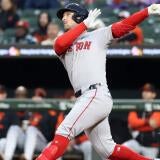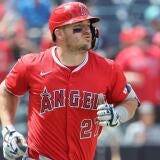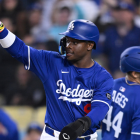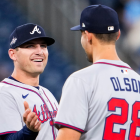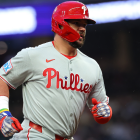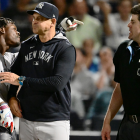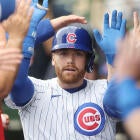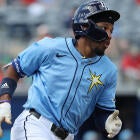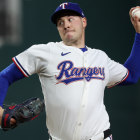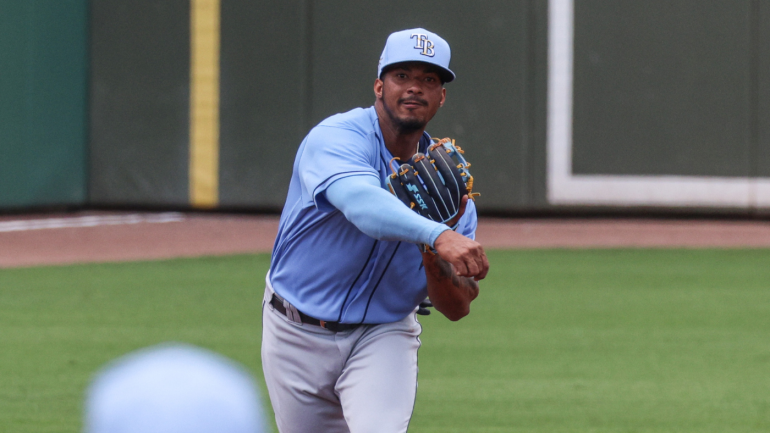
Following a sixth consecutive loss on Sunday, the Tampa Bay Rays announced their intent to promote infielder Wander Franco on Tuesday, ahead of their series against the Boston Red Sox. (The Red Sox, it must be noted, overtook the Rays for first place in the American League East over the weekend.)
Franco, 20, has been widely held as the best prospect in baseball for some time. He's fronted CBS Sports' league-wide top-50 list each of the last two winters, with our more recent report on him stating the following:
Franco is a switch-hitter who makes a ton of contact, much of it hard; he garners above-average marks for his speed and his arm; and ... look, there's just not much he can't do. One rival front-office member said that Franco could've probably held his own in the majors back in 2019, when he was an 18-year-old.
Prospects of Franco's caliber don't come around often, and, as such, we're marking the occasion by highlighting four things you should expect from his arrival.
1. Dynamic offensive skill set
As noted above, Franco has a lot going for him at the dish. He hit .315/.367/.586 with seven home runs, six triples, and five steals (on nine attempts) this year in Triple-A ... and that caused two-thirds of his career slash line (.332/.398/.536) to decline.
Arguably the most enticing part of Franco's offensive game is how he's able to generate power without selling out. In Durham, he was running a .272 ISO with an 11.9 percent strikeout rate. That's exquisite. Per Minor League Splits, he ranked fourth in Triple-A East in contact rate (84.9 percent), behind three players who combined for one fewer home run (six) than he had alone. The only other player in the league with at least seven homers and a contact rate of 80 percent was teammate Vidal Brujan.
OMG.
— Durham Bulls (@DurhamBulls) May 9, 2021
Not all who Wander are lost, BUT THIS BASEBALL WAS.
450 feet
110mph exit velo pic.twitter.com/qMXlyzCcB9
Presuming Franco's feel for contact (and hard contact) ports to the majors, he could join a select company in due time. Coming into Monday, there were 25 players with at least 15 home runs. One, Cleveland's José Ramírez, had a K rate under 15 percent.
Ramírez may prove to be a useful Franco comparison point for other reasons, too.
2. Defensive versatility
Franco has primarily played shortstop throughout his professional career. That's certain to change, as the Rays are said to regard Taylor Walls (another recent promotion) as their best defensive shortstop. It would be reasonable to expect Franco to slide over to third base, the way Ramírez did in deference to Francisco Lindor.
Franco did crosstrain at second base and shortstop this season in addition to his work at third, however, suggesting manager Kevin Cash could leverage his protean nature if he so desires. To wit, Cash has had three Rays (Joey Wendle, Mike Brosseau, and Yandy Díaz) make at least 10 appearances this season at multiple infield positions.
3. B.J. Upton references
It's been a while since the Rays had a player as young as Franco (he'll turn 21 next March) on their active roster.
Indeed, Franco will become the first Rays player to make a big-league appearance during their age-20 season since Delmon Young in 2006. Prior to Young (and, as notably, prior to ex-general manager Andrew Friedman's ascent in late 2005), the Rays had made a habit out of rushing youngsters to the Show: B.J. Upton debuted during his age-19 season; Carl Crawford during his age-20 campaign; Rocco Baldelli in his age-21 year; and so on.
Friedman and his successors have slowed the developmental roll. The youngest debuting player the Rays have had since Young was shortstop Willy Adames, and he was a few months away from his 23rd birthday at the time.
Franco is an exception to the organization's modus operandi in that regard. But, unfortunately, not in another.
4. Service-time arguments
You had to know this was coming.
When we wrote about Jarred Kelenic and Logan Gilbert in April, we surmised that "if you write about prospects, then you'll often write about wage theft." Teams typically refuse to act in good faith when promoting their best prospects; they prefer the alternate route, wherein they keep the player in the minors longer than the player's development demands, all so the franchise can save a trifling amount of future dollars.
The Rays have a long history of gaming the service time of their position players. Even Evan Longoria fell victim to this, as he was sent to Triple-A to work on his defense to begin the 2008 season. He was then, conveniently enough, promoted right as the finishing touches were being applied to a long-term extension that capped his earning potential throughout his arbitration years. (Longoria was, in some respects, the prototype for how the Chicago Cubs handled Kris Bryant.)
These Rays have tried (and so far failed) to convince Franco to sign a long-term deal of his own. Hence abstaining from promoting him until the chances of him qualifying for a fourth arbitration year were minute. It makes for an incredible, highly predictable, pitiful coincidence.
![[object Object] Logo](https://sportshub.cbsistatic.com/i/2020/04/22/e9ceb731-8b3f-4c60-98fe-090ab66a2997/screen-shot-2020-04-22-at-11-04-56-am.png)



